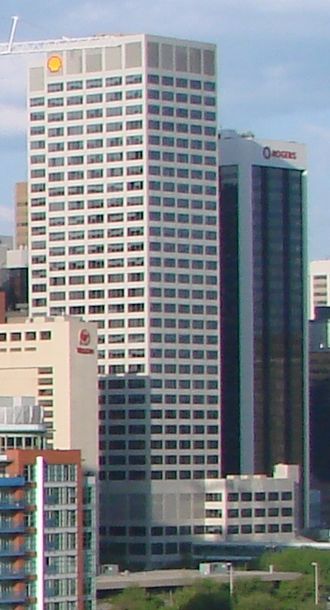Shell Centre (Calgary) facts for kids
Quick facts for kids Shell Centre |
|
|---|---|
 |
|
| General information | |
| Type | Office |
| Location | 400 4 Avenue SW, [[File:|22x20px|border |alt=|link=]] Calgary |
| Coordinates | 51°05′00.2″N 114°07′30.8″W / 51.083389°N 114.125222°W |
| Construction started | 1975 |
| Completed | 1977 |
| Owner | Cadillac Fairview |
| Height | |
| Roof | 140 m (460 ft) |
| Technical details | |
| Floor count | 33 |
| Floor area | 630,000 sq ft (59,000 m2) |
| Lifts/elevators | 15 |
| Design and construction | |
| Architect | WZMH Architects |
| Developer | Olympia and York |
| Other information | |
| Parking | 86 |
The Shell Centre is a tall office building in Calgary, Alberta, Canada. It has 33 floors and stands about 140 m (460 ft) high. When it was finished in 1977, the Shell Centre was one of the tallest buildings in Calgary. It was the fourth tallest, after buildings like the Dome Tower and Stephen Avenue Place.
Building the Shell Centre
The idea for the Shell Centre started in February 1975. A company called Olympia and York Developments planned to build a 33-storey tower. It was going to be built where an old hotel, the Caravan Hotel, used to be. This was Olympia and York's first big project in Western Canada.
From Plan to Reality
Even without a main company signed up to use the building, construction went ahead. During the building process, a large oil company called Shell Oil decided to become the main tenant. This meant Shell Oil would rent most of the offices. Because of this, the building's name was changed to Shell Centre. This helped Shell Oil bring all its 1,000 employees in Calgary together in one place.
Design and Materials
The Shell Centre was built using a lot of materials. Workers used 34,000 cubic yards of concrete and 4,700 tons of steel. The outside of the building is covered with thick slabs of Italian granite. This granite is about 1.25 inches thick. The building also has two levels of underground parking for 86 cars.
Unique Shape and Style
The building has a special shape that looks a bit like a figure eight. This unique design allows for eight corner offices on each floor. A corner office is often seen as a good spot because it has windows on two sides. The main entrance, or lobby, is set back from the street. It is behind a series of strong pillars.
The Calgary Herald newspaper noted that the Shell Centre was a turning point for office buildings in Calgary. Before this, most office towers in the city were quite simple. But the Shell Centre, with its fancy marble and granite outside, showed a new trend. It brought a more elaborate and stylish look, similar to buildings found in American cities.
 | Emma Amos |
 | Edward Mitchell Bannister |
 | Larry D. Alexander |
 | Ernie Barnes |

